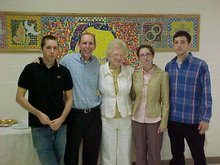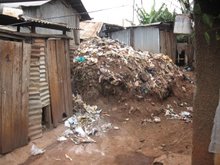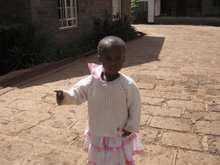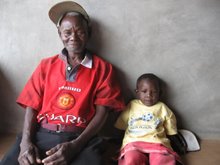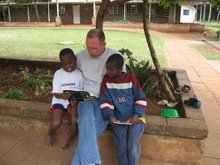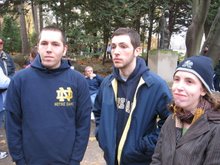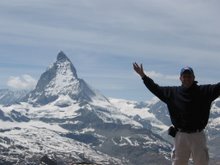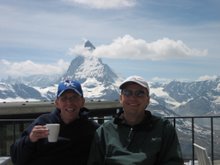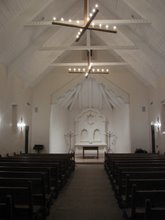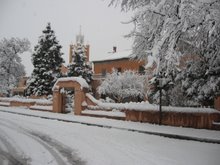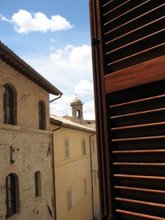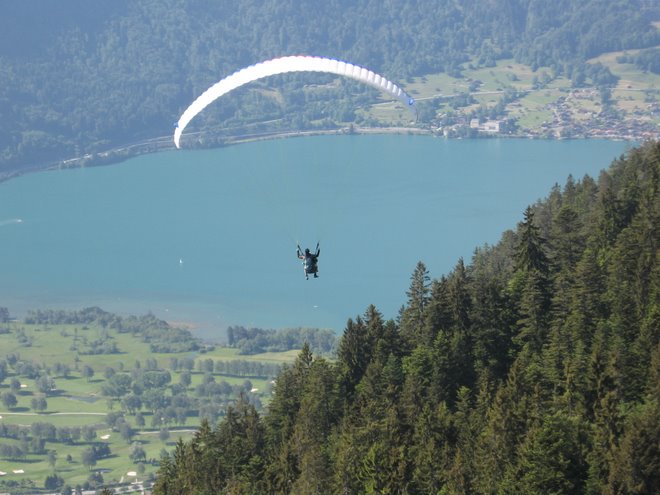
Today is Wednesday March 25, 2009. I went with Mwololo to the ECD Center to check on the cook for the porridge. We hired a woman to cook the porridge for the next two weeks to make sure it was done and done correctly. There is a cholera outbreak in Athi River and we need to make sure things are prepared correctly. Here is a report from the Project Director with information on the porridge/feeding program at the preschool. 
The 10:00 a.m. porridge at the Early Childhood Center is always enriched and usually a meal in itself. It is enriched with such cereal flour as maize, millet, finger millet, sorghum, soya, green grams, groundnuts, pumpkin seeds and powdered milk.
In one day, the cook uses 1.5 kg if the total number of children present is between 40-45. Sometimes the number shoots to over 50 children and the cook uses 2kg of the mix for porridge preparation. This means that between 8-10kg is used within a week. Though the prices of flour change, the following are average prices.
Maize Flour 210
Millet 195
Finger Millet 235
Sorghum 215
Soya 275
Green grams 235
Ground nuts 315
Pumpkin seeds 600
Milk 580
TOTAL SHILLINGS 2860
X4
MONTHLY 11,440 or $143.00 per month
Sometimes the Director sympathizes with the drought situation and purchases sugar to sweeten the porridge, though not always.
Submitted by Mwololo Kilonzo, Project Director
Note from Ed: Milk and water for the porridge is brought from the Masai houses. Today we witnessed the water being boiled first. The milk is boiled separately at the houses of the children. This precaution is due to a cholera outbreak in Athi River.
I put together a handbook for the teachers with information on the national curriculum and syllabus. It is difficult to understand and often more complicated than it needs to be. Objectives, themes, activities will all be discussed at a meeting tomorrow afternoon. The preschool teachers are not yet trained. That comes soon now, after a probationary period. So as far as training, MWEP is sponsoring training for the Preschool teacher, a young Masai man going to school in social work and an adult education class of maasai of 17. Here is what is going on in other parts of the project, some needs and goals:
Masai projects on site here that need continued or new funding
1.) Continuation of providing school fees, uniforms, books to Masai children. Students attend school off-site. (These are not children attending our Early Childhood Center but who attend 9 local schools.) Their fees are due three times a year and we provide uniforms for 176 students, school fees for 63 students and textbooks for 55 students. These are the most needy of the Masai.
2.) School Feeding Program for approximately 50 preschool students at the Esarunoto (Refuge) Early Childhood Education Center – a Preschool which we have begun and staff with two teachers and a cook. We purchase a healthy porridge mixture and it is prepared for the children by 10 a.m. each day. For some, it is their only meal and a reason to come to school.
3.) Medical Van Visits – This would be a new venture. A medical van and two nurses would visit the manyatta at least once a month, preferably twice a month. The cost is for the van, transport and two nurses from Athi River town.
4.) Adult Education Classes – We did a pilot program for four weeks – three days per week and attracted 17 adults. More adults would be available but because of the extreme drought, many adults are gone with the herds to find green pasture. Costs are for a retired teacher and her transport here – three days per week. The classes would run an additional 5 months with an exam following the course. Classes provide instruction for learning English, Swahili, agriculture and Mathematics.
5.) Youth Activity Days – when school is not in session, we provide organized activities that are fun but also teach about important topics such as HIV/AIDS.
6.) Preschool Uniforms – At first glance I didn’t see need for preschool uniforms but after seeing the lack of clothes in general, the uniforms for our Esarunoto Preschool students will be necessary.
7.) Self Help Activities – Not yet initiated but we need to find sources of revenue from beadwork to help make our initiative sustainable. We would provide start-up materials for beadwork and find venues at which to sell the work.
8.) Purchase water for holding tanks - The school needs water for the feeding program (nutrient filled porridge daily). The best option for us is purchasing two large plastic tanks and having fresh water trucked in monthly. The tanks would be secured at the school.
There are also additional needs such as teacher training, HIV/AIDS sessions for youth and women, personnel costs, and emergency food relief (which cost us almost $4,000 due to the continued drought).
We have also looked at two sites for additional projects – although these are in the initial stages of study. Let me tell you about what we know so far about these two possibilities.
Kangundo – a town about 90 minutes from Nairobi. The area is remote, dry, and predominately Kamba tribe. There is no electricity or decent water. A piece of land with a house on it has been offered to the Program Director for use as a Children’s Home. There is also some land adjacent to be farmed – if it would rain! The needs discussed are two: 1.) A place for Masai children from here at Athi River (that we see daily), ages infant – ten years, who are not being cared for by parents or have no parent. There has been discussion by these parents that they cannot provide for these children and therefore, the children suffer. The house would need to be furnished, food provided, social workers to staff, an educational outlet sought - off site or create something there. 2.) There are also homeless children living on the streets in the nearby town of Tala. These children have either lost their parents or have been abandoned. The tribal affiliation would be Kamba. The specific numbers and needs are not yet known.
Kajiado – a town about two hours from Athi River. Kajiado is the ancestral home of many of the Masai we work with here in Athi River. It has not rained there since last March. It is a dry and barren land. Hence the Masai moved on to Athi, River hoping for better grazing. No luck. Anyway, we traveled to Kajiado with a Masai man who has land there that he would like us to use for programming or for needy children in that area. Perhaps an early childhood center, a feeding program etc. similar to what we have in Athi. We are unsure of numbers and needs until some assessment is completed.
So, that is what’s up in Athi River and other places about now! I go to Nairobi tomorrow to print and copy some materials and make some purchases. I also need to do some food shopping. I think I am paying about $15 per week for food and water. Not too bad

The 10:00 a.m. porridge at the Early Childhood Center is always enriched and usually a meal in itself. It is enriched with such cereal flour as maize, millet, finger millet, sorghum, soya, green grams, groundnuts, pumpkin seeds and powdered milk.
In one day, the cook uses 1.5 kg if the total number of children present is between 40-45. Sometimes the number shoots to over 50 children and the cook uses 2kg of the mix for porridge preparation. This means that between 8-10kg is used within a week. Though the prices of flour change, the following are average prices.
Maize Flour 210
Millet 195
Finger Millet 235
Sorghum 215
Soya 275
Green grams 235
Ground nuts 315
Pumpkin seeds 600
Milk 580
TOTAL SHILLINGS 2860
X4
MONTHLY 11,440 or $143.00 per month
Sometimes the Director sympathizes with the drought situation and purchases sugar to sweeten the porridge, though not always.
Submitted by Mwololo Kilonzo, Project Director
Note from Ed: Milk and water for the porridge is brought from the Masai houses. Today we witnessed the water being boiled first. The milk is boiled separately at the houses of the children. This precaution is due to a cholera outbreak in Athi River.
I put together a handbook for the teachers with information on the national curriculum and syllabus. It is difficult to understand and often more complicated than it needs to be. Objectives, themes, activities will all be discussed at a meeting tomorrow afternoon. The preschool teachers are not yet trained. That comes soon now, after a probationary period. So as far as training, MWEP is sponsoring training for the Preschool teacher, a young Masai man going to school in social work and an adult education class of maasai of 17. Here is what is going on in other parts of the project, some needs and goals:
Masai projects on site here that need continued or new funding
1.) Continuation of providing school fees, uniforms, books to Masai children. Students attend school off-site. (These are not children attending our Early Childhood Center but who attend 9 local schools.) Their fees are due three times a year and we provide uniforms for 176 students, school fees for 63 students and textbooks for 55 students. These are the most needy of the Masai.
2.) School Feeding Program for approximately 50 preschool students at the Esarunoto (Refuge) Early Childhood Education Center – a Preschool which we have begun and staff with two teachers and a cook. We purchase a healthy porridge mixture and it is prepared for the children by 10 a.m. each day. For some, it is their only meal and a reason to come to school.
3.) Medical Van Visits – This would be a new venture. A medical van and two nurses would visit the manyatta at least once a month, preferably twice a month. The cost is for the van, transport and two nurses from Athi River town.
4.) Adult Education Classes – We did a pilot program for four weeks – three days per week and attracted 17 adults. More adults would be available but because of the extreme drought, many adults are gone with the herds to find green pasture. Costs are for a retired teacher and her transport here – three days per week. The classes would run an additional 5 months with an exam following the course. Classes provide instruction for learning English, Swahili, agriculture and Mathematics.
5.) Youth Activity Days – when school is not in session, we provide organized activities that are fun but also teach about important topics such as HIV/AIDS.
6.) Preschool Uniforms – At first glance I didn’t see need for preschool uniforms but after seeing the lack of clothes in general, the uniforms for our Esarunoto Preschool students will be necessary.
7.) Self Help Activities – Not yet initiated but we need to find sources of revenue from beadwork to help make our initiative sustainable. We would provide start-up materials for beadwork and find venues at which to sell the work.
8.) Purchase water for holding tanks - The school needs water for the feeding program (nutrient filled porridge daily). The best option for us is purchasing two large plastic tanks and having fresh water trucked in monthly. The tanks would be secured at the school.
There are also additional needs such as teacher training, HIV/AIDS sessions for youth and women, personnel costs, and emergency food relief (which cost us almost $4,000 due to the continued drought).
We have also looked at two sites for additional projects – although these are in the initial stages of study. Let me tell you about what we know so far about these two possibilities.
Kangundo – a town about 90 minutes from Nairobi. The area is remote, dry, and predominately Kamba tribe. There is no electricity or decent water. A piece of land with a house on it has been offered to the Program Director for use as a Children’s Home. There is also some land adjacent to be farmed – if it would rain! The needs discussed are two: 1.) A place for Masai children from here at Athi River (that we see daily), ages infant – ten years, who are not being cared for by parents or have no parent. There has been discussion by these parents that they cannot provide for these children and therefore, the children suffer. The house would need to be furnished, food provided, social workers to staff, an educational outlet sought - off site or create something there. 2.) There are also homeless children living on the streets in the nearby town of Tala. These children have either lost their parents or have been abandoned. The tribal affiliation would be Kamba. The specific numbers and needs are not yet known.
Kajiado – a town about two hours from Athi River. Kajiado is the ancestral home of many of the Masai we work with here in Athi River. It has not rained there since last March. It is a dry and barren land. Hence the Masai moved on to Athi, River hoping for better grazing. No luck. Anyway, we traveled to Kajiado with a Masai man who has land there that he would like us to use for programming or for needy children in that area. Perhaps an early childhood center, a feeding program etc. similar to what we have in Athi. We are unsure of numbers and needs until some assessment is completed.
So, that is what’s up in Athi River and other places about now! I go to Nairobi tomorrow to print and copy some materials and make some purchases. I also need to do some food shopping. I think I am paying about $15 per week for food and water. Not too bad

